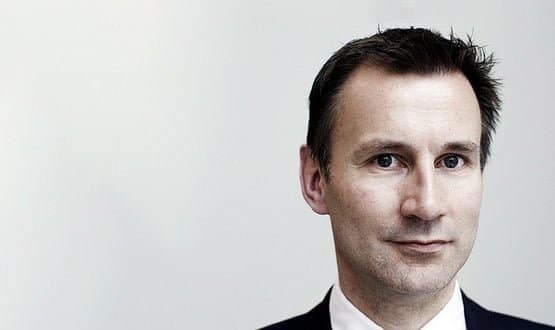NHS will be dependent on EHRs – Hunt
- 6 February 2014

The health service will become “totally dependent” on electronic health records over the next five years, health secretary Jeremy Hunt has said.
Speaking at a Cambridge Health Network event on Wednesday evening, alongside NHS England’s director of patients and information Tim Kelsey, Hunt said 2013 had been a tough year for the NHS, but he is feeling “very optimistic and very encouraged” about the strides made in terms of transparency.
He said three things will become an “absolute given” over the next five years. The first is that the health service will become totally dependent on electronic health records and people will wonder how they ever lived without them.
He envisioned a future whereby anyone involved in a patient’s care will be able to view their medical and prescribing history, making continuity of care much easier.
“You’ll be able to talk to a NHS 111 operator or email a GP you haven’t met before who will know enough about you to make it a meaningful interaction because they will have your medical history,” Hunt explained.
He promised that by the end of 2014, at least one third of A&Es should be able to see the GP records of their patients and at least one third of 111 services should be able to access the GP record of callers.
The second big development is that “care.data will be absolutely massive”. The care.data programme will link an expanded set of Hospital Episode Statistics with a new monthly collection of GP data to create Care Episode Statistics.
The data collected from health care providers is identifiable and will be stored and linked in the Health and Social Care Information Centre before data for some uses is stripped of identifiers and released to commissioners and researchers who can prove a benefit to patient care.
Hunt said the NHS will “get through” the heated public debate this scheme has caused regarding patient privacy and the potential for the data to be reidentified.
“The reason we’re having it is because [Kelsey] decided to send a leaflet to every household to tell them about what was happening and the result of that is we will earn the trust of the public because we’re being open about it and giving them a chance to opt-out,” he said.
Hunt said that when care.data information is linked with the sequencing of human genomes, “we are going to get into a whole new world when it comes to understanding disease”. This will pose problems for politicians when working out what to fund, but “will be fantastic for humanity."
The third big change will be patients taking charge of their own “health destinies”. Giving patients access to their own records will push forward the self-care agenda and there is a lot of excitement about the opportunities that will bring.
“Put those three things together and we should be a lot more excited and optimistic and hopeful,” he told attendees. “The trigger is that money is tight and when used well, technology can help use resources much more effectively.”
Kelsey told the network that “something significant has changed in the past 12 months” as people inside and outside of the NHS come to understand the opportunities technology offers to transform health and care.
He cited the new GP contract as signalling “the beginning of online health." The contract says that from this April, all GPs will start providing appointment booking and ordering of repeat prescriptions online, as well as access to their record, with the minimum being access to the information held on their Summary Care Record.
Kelsey said that from April 2015, the full GP record will be available to patients. Last year, surgical outcomes data was published for nine specialities. Kelsey said the plan is to publish three to five new datasets on non-surgical specialities this summer.
He added that one thing he continued to be “really worried about” was the need to make it easier for small and medium-sized enterprises to do business with the NHS, as collaboration with the private and not-for-profit sector will be key to ensuring a sustainable future for the health service.
Take EHI's care.data survey online.




